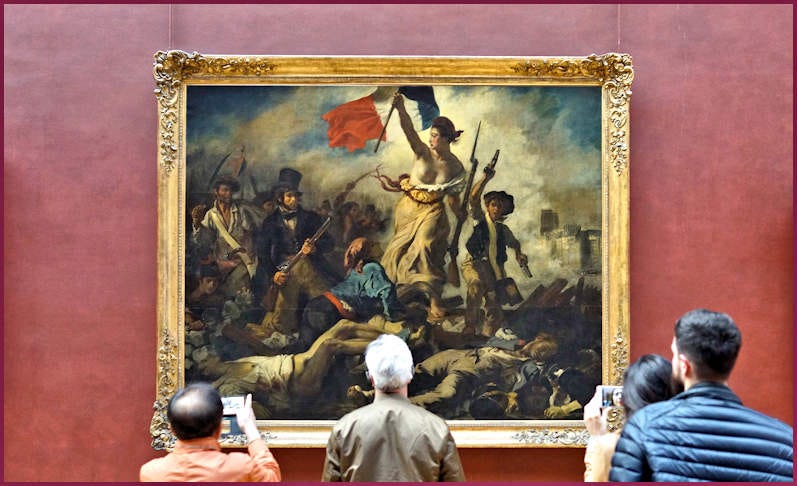OK, you got me, my title verges on clickbait …
But seriously, we will investigate elements of this question, yet leave answering to the Ages, where it will always belong!
(The following excerpts represent about 14 pages worth of a 275-page book).
The author was born in Hungary in 1936 (Wikipedia bio link)
At (age):
(12) made his professional concert debut at the piano.
(20) fled Soviet Communist Hungary on foot, to Austria.
(23) arrived in Florida for a college scholarship position, with $23.
(62) wrote this book (1998) after years in musical performance and professorship.
The man lived under Soviet Communism for 7 years of his young life (1949-1956).
For the last 8 years of his life, he was a noted political philosopher (died 2003).
Wikipedia has an excellent paragraph of combined excerpts which I will lead with, because it summarizes well the principles he bids us believe in, along with the errors in governance he bids us condemn.
We advocate and practice discussion of national issues as they relate to America's founding principles. For continued success, we believe this nation needs to return to the Rule of Law, Individual Rights, the Security of Property, and the same American Identity for all its citizens ...
As time progressed, the creation of commissar positions in America acquired the dimensions of a growth industry. The avalanche began with affirmative action officers … and civil rights divisions. These positions exist for the sole purpose of enforcing a political agenda – an occupation at odds with the very nature of America.
Certain college and university departments … education … communications … journalism … urban planning … became the reliable producers of commissars. Law schools, too, began to churn out graduates trained to serve a specific political agenda, rather than jurisprudence ... Soon, entire government departments were created to function as Commissariats, such as the Department of Education, Health and Human Services, the EPA … Energy … Commerce. Several other federal agencies, such as the National Endowment for the Arts (also “for Humanities”), fall into the same category.
All these agencies offer services people find useful and employ many capable professionals along with commissars. But they are of the same cloth, for they provide a platform for commissars, lack constitutional legitimacy, and are virtually immune to citizen complaints.
Eventually, commissar types found their way into legislatures, the Supreme Court, and the White House. The recent acquisition of the Department of Justice as a commissariat, and the growing multitude of commissar judges on federal benches, complete this massive force whose effectiveness – unlike the armies and submarines of the Third Reich or the ICBMs of the Soviet Union – has proved a match for America's awesome industrial, financial, and spiritual strength.
**Wikipedia, quoting from the book we are discussing
I love his use of the term “commissar” ─ namesakes of the functionaries he met as a young man in Soviet Hungary. It accords with our use of the word czar in our federal executive branch, e.g. “drug czar.” I learned only yesterday that we’ve had many “czar” positions, beginning with FDR (link). Baby Bush and Obama had the most czar positions (33 and 38 respectively).
Such operatives are closely allied with technocrats.
During the COVIDEXCUSEFORFASCISMCRIME our state health directors became “pandemic czars” and told you and me what to do and when to do it.
Technocrats are unelected, and always much smarter than the ordinary Joe, which explains why they are “immune to citizen complaints.”
Remember too the principle of the administrative state, wherein the three branches of government are fused into a “my way or the highway” behemoth. For example (true story from Michigan) the department of natural resources decides landowners with river frontage can’t let their horses drink water from the river because they trample the ground and disturb a fragile ecosystem. They make the rule (legislature), employ the rule (executive) and punish those who ignore the rule (judicial), and make it stick by using the police powers of the state.
The author will be discussing what most people recognize as the tug of war between the right and the left, capitalism and socialism. This debate has pathetically devolved into “socialists want to give my tax money to bums and slackers” and “the right wingers are mean troglodytes who lack nuance in life.”
(Let us here remember that the author is no troglodyte, but a musical artist of the highest caliber).
Let us discuss these issues in an idealistic sense, an aspirational sense. I think both viewpoints have certain merits, and certain blind spots, but our Earth life is massively imperfect. If conditions make a mockery of ideals, you don't abandon ideals, you try harder. Cynicism is a stimulating but unproductive sophistication of the adolescent.
What is a good man but a bad man’s teacher? What is a bad man but a good man’s job?
**Lao Tzu, in his Tao Te Ching
I agree with the author (why else would I do the work …) and when confused, I can always return to his four guiding principles:
>< Rule of Law
>< Individual Rights
>< Security of Property
>< A universal American Identity
LET US BEGIN (page numbers are for my guidance only).
Subscribing to LIAR$$WORLD is free, hoping that you will pay-subscribe to other Substackers who have more expenses and post more often.
5
But the most telling difference was in attitudes. While people elsewhere operated on the premise, "If I haven't got it, he shouldn't have it either," Americans seemed to say, "If he's got it, I ought to be able to have it too, if I just work hard enough." The ability of generation after generation actually to fulfill such desires helped maintain what appeared to be a union not merely of fifty states but, more importantly, of some 250 million individuals.
This is more important than material yearning.
There is a “genie in the bottle” joke from the Cold War Era that will amplify: A German and a Frenchman and a Russian release a genie in a bottle … three wishes … the first two ask for unsurprising blessings … then the Russian says, “My neighbor has two cows, and I only have one. Will you kill one of my neighbor’s cows?”
This is not funny! This describes a zero-sum mentality. My heart breaks for these victims of totalitarianism.
9-10
Four years later, when I was seventeen, I had the "pleasure" of another disciplinary trial. After the head of the piano department at the famed Liszt Academy gave his "communist word of honor" in public that no harm would come from a frank airing of complaints, I spoke at some length about being denied permission to go abroad either to study, or to participate in international competitions ─ both indispensable for budding musicians with a serious career in mind. This time, my trial involved the entire Communist Party organization of the Music Academy, the faculty, and the students. I was given to understand that the punishment would be expulsion from all institutes of higher learning.
Owing to the heroic effort of some of my professors, I got off with a stern final warning and was forbidden to give concerts for six months. Compared with some who were exiled for two years for the simple act of telling a joke about political leaders, the punishment was mild. But all my experiences confirmed the perception that socialism in all its forms placed unlimited power in the hands of persons who were contemptuous of other humans, and whose basest instincts were unleashed in the process.
This was 1953. The events recounted are reminiscent of the “Hundred Flowers Campaign” of 1956-7 in Maoist Communist China, wherein the public ─ especially the intellectuals ─ were invited to speak freely and list any objections to the civic practices of the regime. After many gullibly spoke their mind, countless thousands were rounded up and sent to camps for labor or execution. It’s simple: communists are LIARS and their deceptive system is built upon LIES.
As to the last sentence, it is true that people who are keenly drawn to power consider themselves superior to most others and enjoy making demands. Communism efficiently harnesses this character flaw in the subjugation of peaceful and kind‑hearted citizens by their former peers, newly empowered.
13
"Reactionary," "exploitation," "oppressor and oppressed," and "redistribution" were some of the words taken straight from the Marxist repertoire. The term "politically correct" first came to my attention through the writings of Anton Semionovich Makarenko, Lenin's expert on education. Adolf Hitler preferred the version "socially correct."
Lenin was in power 1917-1924, making “political correctness” at least 100 years old! Lenin murdered several million RUSSIANS, and today we are urged to think that PC is about not hurting someone’s feelings. Yeah, right.
49
That document is known as the Constitution of the United States. Nothing like it had ever existed. It was unique in the public deliberation that led to its adoption; unique in the brevity and simplicity for a document of such immeasurable significance; unique in the influence it acquired and has held in the hearts and minds of freedom-loving people around the world.
The framers of the Constitution understood the wisdom of making few laws. The fewer the laws, the broader the agreement. The broader the agreement, the less need for enforcement. The less enforcement, the less friction between government and the governed. And the less friction, the less waste of time and energy. The time and energy thus freed vastly increases people's creative capacity. That, in a nutshell, is the success story of the United States of America.
This is an inspiring passage for me, and I hope I understand it correctly. I once read that (as I recall) English Common Law permits that which isn’t prohibited, whereas Roman Law and, thence, Napoleonic Law prohibits that which isn’t permitted. You can see that the latter would be quite cumbersome in trying to list everything which is deemed OK by the government. Unfortunately, the US has become an administrative state which is drowning in vast seas of regulations and picayune rules for nearly anything imaginable. To repeat, we are focusing here on ideals and stripped-down concepts.
50
DECLARATION VS. CONSTITUTION
Along with the debate about the nature of 1776 ─ a war of independence or outright revolution? ─ is another debate that pits the Declaration of Independence against the Constitution as the defining document. Here the metaphor of the path and the road map will be helpful. And the Federalist Papers can be described as a glossary to the road map. Not least because of the orderly manner in which the Constitution may be amended, the three together have withstood every manner of upheaval from both within and without.
A fascinating analogy! Aside from our bloated bureaucracy, we're really not doing too badly overall, especially when the majority of Americans think we are living in a Constitutional Republic. This makes it difficult for the cabal to openly display their subterfuges and deformations; and we must always strive to detect THEIR hidden activities.
51
Then, sometime in the 1960s, a serious challenge was issued to the Rule of Law. The concept behind the challenge had been around for a long time. Antecedents of it can be found as far back as the Bible. But in the United States of America it never presumed to replace the supreme law of the land. In the United States of America, it never attempted to alter a way of thinking that had proved impervious to assaults and threats of all kind.
The challenger called itself "social justice."
53
CHAPTER SEVEN
"SOCIAL JUSTICE"
A MONUMENTAL DECEPTION
The quotation marks in the title are used advisedly. The words themselves are among the most successful deceptions ever conceived. Ask a variety of people to define what "social justice" means, specifically, and you will get as many answers as people queried. Ask the same person at different times and you will get different responses. All "definitions" of social justice boil down to any of the following:
(1) somebody should have the power to determine what you can have, or
(2) somebody should have the power to determine what you cannot have, or
(3) somebody should have the power to determine what to take away from you in order to give it to others who receive it without any obligation to earn it.
If millions upon millions have been deluded into searching for "social justice," it is because "social justice" displays the irresistible charm of the temptress and the armament of the enraged avenger; because it adorns itself in intoxicating cliches and wears the insignia of the highest institutions of learning. Like a poisonous snake, it radiates brilliant colors. Like the poppies in The Wizard of Oz, it lulls the mind to sleep.
The easiest targets happen to be civilized people, who care about the fate of others. Americans, especially, are famous for their concern for fellow humans and support of worthy causes.
This is a toughie! Words have power IF YOU LET THEM.
Manipulators will wield words for undisclosed purposes. Friends like you and I, dear reader, will hope to perceive meanings honestly, as best we can.
Consider the word “discriminate” (verb form).
I just consulted Merriam-Webster and got these two descriptions: “to mark or perceive the distinguishing or peculiar features of” AND “to distinguish by discerning or exposing differences: to recognize or identify as separate and distinct”
BUT if you use this verb (and for many years now) it will consistently impart the flavor of racial prejudice and beg to be avoided.
So, who in their right mind would be against “social justice”? Someone like the author, trying to expose subterfuge.
This term is a political invention of revolutionary utility, like the wheel, or the bow and arrow. It’s also a Trojan Horse.
Life is not pleasant for everyone. Even if we cancelled the circumstance that the cabal has stolen at least a third of the wealth of global society, without any reciprocal benefit, i.e. if we restored that wealth fairly, Life would still not favor every person.
George Soros is famous for making a billion dollars by shorting the British pound. He is also famous for funding “social justice” entities. What’s wrong with this picture? Such folk want to dictate what justice is and where it will be applied.
“Social justice” also relates to the motto first used in the French Revolution – “Liberte, Egalite, Fraternite.”
It’s word trickery. Liberty and Equality are mutually exclusive. If you make everyone equal, no one will be free. If people are free, there will exist inequalities. And though Fraternity sounds cozy and all, it is actually a tacit nod to the high-level Freemasons who organized this historical tragedy. Their fraternity is not open to you.
The allure of “social justice” has, recently, brought us to the condition where illegal aliens are given free housing, free medical, free food, free debit cards, and more, whilst US citizens are homeless in record numbers. Also, we witness this concept in the form of Lia Thomas, a muscular 6’1” man stealing swimming trophies from hard working college women because … well, if you don’t understand, you’re just crabby and mean. Both of these phenomena are now being reversed, not without continued disagreement.
Here’s a recent news story which might help clarify “overdoing” the justice thing:
“Climate justice” provisions in the Chicago Teachers Union’s (CTU) new contract are colliding with financial reality as the city’s low-performing public school system faces a projected $734 million budget shortfall.
CTU’s $1.5 billion collective bargaining contract with the Chicago Board of Education, ratified in April, cemented many of the union’s climate demands, including the formation of a Green Schools and Climate Preparedness Committee, the installation of solar panels, and the construction of new “green” school facilities. Supporters tout the deal as a “strategic use of capital,” but critics say it reflects misplaced priorities in a school district already struggling with a budget deficit, falling enrollment and chronically low academic achievement.
“Instead of finding ways to improve student performance in the classroom, the Chicago Teachers Union spent their bargaining time negotiating for costly, environmental policies in their latest contract,” Mailee Smith, director of labor policy for the Illinois Policy Institute, told the Daily Caller News. “Chicagoans just want somewhere safe to send their kids so that they will learn how to read and become independent. Bargaining over other topics serves as a distraction from CTU’s poor record in the classroom.”
64-65
Yet, how can we apply a word as strong as "communist" to people who merely advocate "flexibility" in the way the Constitution is applied, and do so in "the interest of the poor, the underprivileged, the needy, the forgotten"? Surely, this is a case of "hate speech," and just another display of "mean-spirited conservatism."
But the poor, the needy, the underprivileged, and the forgotten existed before the 1960s. Millions of them came to America from other lands, precisely because they had reason to believe that in America, they would have the opportunity to improve their condition. And they were right. A constantly growing number of old and new Americans gained increasing access to the steadily accumulating wealth of the nation. The promise of liberty was fulfilled for more individuals than in any other society on earth. Until recently, no one questioned the principles on which this nation was founded, for it was understood that adherence to these very principles produced the enviable results.
Here, recall one of the four principles mentioned above, “security in property.”
One of the reasons citizens of many countries around the world are poorer than we are is because land ownership is legally difficult (red tape) or impossible (not legal) to establish. Asset ownership enables a private citizen to leverage the fruits of their work to finance further enterprises.
73
DEFINING RIGHTS
The rights listed in the Constitution have certain aspects in common. For our purpose here, we need only examine two of these. Individuals may assert them at will, and governments must guarantee them at all times. Our judiciary, the third branch of government, was established to interpret the scope of those rights – not to invent entirely new types and categories of them. Clearly, if we no longer agree about the nature of rights, we are challenging the very foundation of our legal order.
Title VII of the Civil Rights Act of 1964 protects job applicants and employees from discrimination by an employer or potential employer based on the employee or applicant's color, race, sex, religion, and national origin.
We could say this was unneeded, but it’s been with us over 60 years, so let’s just say it was a clarification of rights we already possessed.
The extreme extension of the principle of “rights” was non-discrimination toward SEXUAL ORIENTATION – and we narrowly dodged that bullet. Some places have it (like my beloved Michigan), but it’s largely a non-starter now. The reason is simple – it requires ordinary citizens to prioritize strangers’ exotic delusions over their own convictions. The last vestiges of this attempt at codifying chaos are the “I identify as” memes one sees occasionally.
78-79
GROUPS
Groups are as impossible to define as "social justice." The first question must be: Is everyone a member of a group? If not, how can equality be promoted when some people are in a group, and others are not? If all people are in one group or another, is everyone a member of only one group, or is membership open to a person in any number of different groups? Is there a limit on the number of groups in which a person may be a member for official purposes? And who decides all these questions?
This may sound facetious, but it is deadly serious business. People are punished if they fail to take it seriously. If the questions do not demonstrate the nonsensical nature of the proposition, attempts to answer them will.
Take, for example, a black teenage girl who walks with a limp and is being brought up by lesbians. Is she a child? Is she a woman? Is she an African-American? Is she disabled? Is she a lesbian? She must know, because the government wants to know. If she answers yes to all the questions, she will have herself a whole basketful of rights. Over and above her constitutional rights, she possesses children's rights (still), women's rights (already), affirmative action rights, disabled rights, and gay-lesbian rights. People have to be mindful of speaking not only to her, but about her. Anyone near her is but one step away from sensitivity training at best, loss of livelihood at worst.
Once again, the more groups we have, the more "rights" we have. The more groups we have, the farther we drift from the rule of law. The more groups we have, the more restrictions we have on our true rights: individual rights.
Individual rights reflect our similarities; group rights emphasize our differences. Individual rights promote equality; group rights cultivate inequality. Individual rights permit every one of us to be special; group rights create stereotypes. Individual rights are unalienable and are guaranteed by the Constitution; group rights are born at activist rallies, conferred by a party-political executive branch, and confirmed by a temporal judge. Group rights can be taken away by an even louder rally, a different regulator, a new judge.
Individual rights and group rights are mutually exclusive; we cannot have it both ways.
Individual rights provide a sense of security. The greater the sense of security, the more of people's creativity will be converted to productivity. The higher the productivity, the greater the sense of independence.
Group rights instill fear. The greater the fear, the more the limitations on human activity. The greater the limitations, the more total the dependency on the wielders of regulatory power.
Group rights – invented rights, that is – come, of course, with an important financial dimension. The bearer is entitled to unearned benefits – more directly put, to the fruits of other people's labor. Of greater significance, however, is the gradual destruction of society by the fear that attends group rights.
“Individual rights reflect our similarities; group rights emphasize our differences.” Ironically, group activists speak often of “inclusion” – and then their actions set them further apart from the body of quiet, ordinary citizens. To paraphrase Martin Luther King:
“I look to a day when people will not be judged by the (INSERT IMMUTABLE DIFFERING CHARACTERISTIC HERE), but by the content of their character.”
As to the “fear” in the last sentence, think of the public-school teachers who were fired for refusing to use some deluded idiot’s weird pronouns.
And, lest you think me insensitive, I think it is wrong to mislead a young person into thinking that the people of the world give a crap about one person's particular fixation. Life is tough and people are just trying to survive in their own little half acre.
To quote Gram Parsons:
Said, that'll be cash on the barrelhead, son
You can take your choice if you're twenty-one
No money down, no credit plan
No time to chase you, 'cause I'm a busy man
79-81
WHEN A GROUP IS NOT A "GROUP"
A discussion of group rights must consider various forms of association for which legal provisions exist. "What about corporations? What about farmers?" are popular retorts to assertions that group rights lack legitimacy.
The act of forming, joining, or leaving corporations is freely available to all. They are based on the right to free association, and the right freely to enter into contract between consenting parties. If the freely elected representatives of the people deem it in the public interest to establish certain rights for corporations, such rights are available to all, since anyone may form or join a corporation – or leave one, as the case may be. Anyone may become a farmer, or decide no longer to be one.
By contrast, "women's rights," "children's rights," and "affirmative action rights" pertain to persons who have no choice in the matter. An individual is neither in a position to become a member by choice, nor – by an act of will – to give up membership in the group … through the accident of birth … persons are locked in for life.
"Locked in for life" – surely nothing stands in greater contradiction to the very foundations of this country. People have been coming here for more than two centuries in an effort to escape the constraints of birth that stood in the way of the pursuit of happiness in their native lands. The very essence of America has been unrestricted mobility – up, down, or sideways – in the societal structure …
Finally, corporate-type rights are quite different from constitutional rights. Congress (or any of the several states) can grant rights to corporations and other forms of associations, but the same body can also alter or remove such rights.
By contrast, the fundamental individual rights guaranteed in the Constitution are not "subject to change" by any legislative body on its own; they require an amendment of the Constitution …
So, when is a right not a right? When it is neither possible for an individual to assert it, nor for government to guarantee it, and – last but not least – when it is not equally available to all citizens.
This is a restatement of covered material, but I value repetition and hearing ideas in slightly different form. This passage made me think of “identity politics.”
Identity politics is politics based on a particular identity, such as ethnicity, race, nationality, religion, denomination, gender, sexual orientation, social background, political affiliation, caste, age, education, disability, opinion, intelligence, and social class …
The term identity politics dates to the late twentieth century …
Contemporary identity labels—such as people of specific race, ethnicity, sex, gender identity, sexual orientation, age, economic class, disability status, education, religion, language, profession, political party, veteran status, recovery status, or geographic location—are not mutually exclusive but are, in many cases, compounded …
**Wikipedia
… wheelchair-bound, non-binary, homeless, Jewish Eskimo, senior citizen?
What a mess! Wouldn’t the one‑and‑done “individual rights” be a welcome relief at this point?
Let’s look at this section from earlier in the book to expand on these “group” themes:
20
There was an overdue civil rights movement, and there was an equally "overdue" sexual revolution. All these, the nation was led to believe, were consistent with traditional American aspirations. All these, the reasoning went, were consistent with the traditional debate about the implementation of American principles. The impatience of youth and the delay in the desegregation of black Americans may have produced an explosive mix, commentators mused, but different generations tend to be, well, different.
But if so, why the substitution of a "search for social justice" where once the law ruled? Why the proliferation of group privilege to the detriment of individual rights? Why the abolition of guaranteed property through regulation, redistribution, and entitlements? Why the daily assaults on our common American identity by hyphenation, bilingual ballots, multiculturalism, and phony history books?
(Arnie abridging: The author states here that these measures were tied to the desired evolution of US society toward socialism.)
(1) Americans were reminded frequently of their failures, and of various "wrongs" they and their country had inflicted on an ever-growing multitude
(2) Americans were persuaded that all apparently new ideas were, in fact, old American ideas and that by acting in accordance with those, they would become "better Americans"
(3) a constantly expanding range of people who had been "unfairly treated" and "deserving of special treatment" could be produced to keep the conscience of Americans troubled.
All three have come to pass. As a result, any suggestion that harm to America could be intended was made to sound preposterous. How can a "more perfect" implementation of "American ideals" possibly harm America?
Also remember that this time period saw the demoralization of society by the Viet Nam war – a criminal enterprise with multiple hidden agendas and a pre-planned stalemate.
Notice the author calls the Civil Rights Movement “overdue,” showing he’s not a hard-hearted stick-in-the-mud.
As for the “sexual revolution,” in 2006 Aaron Russo produced the documentary “America: Freedom to Fascism” (available on Rumble and Bitchute) Around this time he did an interview in which he told of meeting Nick Rockefeller, who invited him to join the elites and forget about the “serfs.” Nick told him that one of the main reasons for the Women's Lib movement was that “we” could only tax half the population at the time. I remember how sick I fell hearing this vile man use the royal “we” when speaking of our illegal communist income tax. The single-earner family was to be largely dispelled, and more worker bees activated. This is a measure of the cabal's reach.
83-84
CONSTRAINTS AND LIBERTIES
One need not be a practitioner of any religion to appreciate the enormous significance that the Ten Commandments had in America's founding, regardless of their origin …
In the broadest sense, we might think of man's existence in three phases. The first was characterized by the unbridled freedom of instinctive behavior, much as in the animal world. The second brought constraints which, for some time, were forced upon the many by the few. Third, and closer to our own time, the ability of some to recognize the benefits that result from an acceptance of constraints led to the emergence of liberties within a well-defined structure. As acceptance of the constraints broadened, the guarantee of liberties could be extended. The most notable success of this reciprocal relationship may be observed in two centuries of immigration to America. Until recently, the premise has been a simple one: Newcomers who were willing to accept the constraints, not necessarily extant in their country of origin, were offered a share in the liberties. Chief among these has been the recognition that the only dependable guarantee of one's own rights is the concession and guarantee of those same rights to one's neighbor.
I once saw Common Law described as The Golden Rule negatively expressed – “Don’t do unto others as you would not have them do unto you.” This is powerful stuff – and SIMPLE.
105-107
TWO VIEWS OF THE WORLD
Awareness of the long-term rivalry between the two lines of thought makes sense of much in history, and even more of contemporary developments. The designations "Franco-Germanic" and "Anglo- American" were chosen because they are broadly accurate, and because they make it clear that the conflict is not between different interpretations of American principles …
… schools of political thought emerged only in a very few places. Individual thinkers may be found elsewhere from time to time, but it was only in England, France, Germany, and America that political thinking was practiced and published regularly …
The context is one of irreconcilable differences between two views of the world. One view, the Anglo-American, holds that human ability to comprehend, adjudicate, and arrange the world around us is limited; that the only attainable goal is continuously to improve the conditions which enable individuals to achieve their personal best. The other view, predominantly Franco-Germanic, places human reason at the center of our existence, claiming that certain people are capable of comprehending, adjudicating, and arranging the world around us; and that such people are called upon to guide all others toward an increasingly perfect and just world in which all desires will have been either eliminated or satisfied.
Traditional labels are the last obstacles in the path of understanding. Societies modeled on the Anglo-American line are often referred to as capitalist, or democratic, or classical-liberal. True to its tradition of using arbitrary and contradictory words to camouflage substance, the Franco-Germanic line has been known as statism, collectivism, socialism, fascism, Nazism, communism, bolshevism, Maoism, or modern liberalism. The "-ism" in each label is significant. The need to paint the Anglo-American side also as an "-ism" led to the term "capitalism," which was proposed by those who oppose it.
It is inaccurate to use the label "capitalism" because all other "-isms" prescribe a set of conditions to which society must conform, if necessary through coercion or by force. Freedom of enterprise and guaranteed ownership, on the other hand, are prerequisites of general prosperity – something that needs to be there to begin with, and which leads to what Friedrich Hayek aptly describes as the "extended order of cooperation." Hayek further proposes that this extended order exceeds the ability of any person or group to organize, and that it can only evolve naturally under certain conditions. Such notions, of course, are anathema to proponents of the Franco- Germanic line who hold that effective planning is not only possible but also essential, and that it must be undertaken by those whom the noted thinker Thomas Sowell calls "The Anointed" in his book The Vision of the Anointed.
That is why the attempt is made here to reduce the two lines of thought to bare essentials and to dispense with misleading labels. By focusing upon the underlying concepts, seemingly unconnected events of the past and the present emerge as a logical sequence.
What began as a mildly sarcastic criticism of John Locke by Immanuel Kant grew into an full-blown intellectual confrontation by the mid-to-late nineteenth century. One side (Ed. Kant) was preparing the ground for a closed, regulated, directed-from-the-top society, asserting that such societies would, by definition, be just. The other (Ed. Locke) "muddled along" by trial and error, trusting that instinct and enlightened self-interest would correct aberrations and lead to continuous improvement. In economic terms, the first is a zero-sum proposition, necessitating the most stringent prescriptions with regard to the distribution of national product. The other is a tale of constantly accumulating wealth, providing increased access to a growing number of participants. The legal comparison is more revealing still. As discussed earlier, one is a matrix of codified laws to which all have to conform, and in which guilt or innocence is established by professional jurists; the other is an evolving collection of common law and precedents, in which verdicts are delivered by citizen juries.
Let us remember that we are discussing IDEALS. The sad reality of the present-day US is a bureaucratic administrative state surreptitiously controlled by the titanic corporations – fascism! But the system is fragile, and the more of us who discuss these concepts, the more difficult it is for the cabal to worsen matters, and you know THEY always want more.
The author is saying that “freedom of enterprise and guaranteed ownership” should not be called “capitalism” because the actual system has been corrupted and the word “capitalism” has been forever tainted. This is the tension between Wall Street and Main Street, and Wall Street routinely hits below the belt.
175
The second error occurred when German methodology was married to French egalitarianism, as in the writings of Marx. For obscure reasons, even detractors of Marx credit his "great contributions" to economics. My generation received theoretical training in Marxism and experienced the starvation that inevitably follows when it is applied. Marx prescribed taking into "public" ownership all means of production. That doctrine proved a disaster wherever consummated. State bureaucracies are utterly unable to manage economies. But the error should have been obvious to Marx himself. For it was none other than Karl Marx who explained the failure of all previous economic systems as the failure to ensure that all participants in the process of production have a vested interest in its outcome. The same Karl Marx then prescribed a recipe that made certain that no participant in the process of production had a vested interest in the outcome.
I’m sure the author would agree when I say “no participants” means the man on the street, not the financial elite – they who always dine sumptuously.
176
LESSONS LEARNED
Both the religious organization of the party and continued use of the "communist" label required that people be kept uninformed – a Russian tradition of long standing. But with the breathtaking development in communications, a label tainted with the blood of millions, and a hierarchy long since declared inefficient, the party could not (and did not) survive. Practically no one is a "communist" today. What happened? Fundamental attitudes don't disappear into thin air. People might die, but ideas rarely do, especially when the idea is one of only two major strains of political thought that excite the people, dominate the minds, and determine the affairs of man for centuries.
The more credible assumption is that the lessons have been understood and learned. Certainly, when it comes to the third "error," there is every appearance of success. The labels – communist, socialist – have gone altogether. If anyone attempts to use them, a chorus of protest is unleashed: "Are you looking for reds under every bed?" And, "The Wall is down; what more do you want?" Then follows the branding "redbaiter" or "redbasher." But most don't even try. The only "old" label retained comes from Stalin's clever deception – calling German national socialists "fascists." Today's communists and their dupes tend to call everyone they don't like a "fascist."
It must count among the most amazing spectacles of history to be inundated with the rhetoric, theory, and practice of communism, and see not one communist around. We read and hear daily about class warfare, redistribution of wealth, the "dispossessed" masses, the disadvantaged, universal health care, speech codes, sensitivity training, restrictions on parents' rights, school-to-work – the list goes on and on. The agenda is with us, the Party is not.
We're nearing the end, and it seems the author feels he has earned the right for a bit of sarcasm, and I agree, and this is especially funny. We're surrounded by communist behaviors, but all the communists are gone! In case this saddens you ─ take heart ─ they live on in the form of the present-day TECHNOCRATS ─ those really smart people who somehow know what you need to do and when you need to do it.
Admittedly, I’ve been cherry-picking from this book, but I’ve been trying to capture the essence of Balint’s message, not distort it. I am honored to have heard his words of wisdom, gleaned from real-life experience.
Let’s end with an anecdote from the book:
267
IN THE FALL of 1954, the Central Committee of the Communist Party sent a new secretary to Budapest's famed Liszt Academy of Music to head the Academy's party organization. The new man thought it appropriate to present himself to the nation's senior musician, Zoltan Kodaly. He knocked on the door of the master's studio, went inside, and explained the reasons for his visit. Kodaly, as was his habit, looked out the window for some time.
He then asked, "What happened to your predecessor?"
"He went back to his trade."
"What was his trade?"
"He is a hatmaker."
"And what is your trade?"
It was now the secretary's turn to consider.
"I've always worked in the movement."
Kodaly turned around from the window and regarded his visitor for the first time. Then he looked out the window once more and asked, "To what will you go back?"
The 1960s gave birth to a new type of American: the professional political activist, whose entire working life would be spent in "the movement." The illustrations reveal a remarkable similarity in these lives, the two most obvious being the absence of participation in an enterprise, trade, or profession—in any nonpolitical occupation and the use of tax revenues as the source of income.
Thanks for stopping by! Best wishes to you in your own studies and convictions.
Please feel free to write me at:
arnie1815@proton.me















Hey Arnie,
Another thoughtful post from a fellow from one of my home countries.
I can, however, save people a lot of time and corn fusion by destroying the myths on which all of his premises were built.
In Logic and Critical Thinking if the premise is false then all else that follows is false.
It will always begin with the words:
Freedom as revealed by Clint Richardson is a trap-word in that you can be IN PRISON yet have the FREEDOM of the cell. You are FREE to DOMinate every millimeter of it including crawl on the ceilings but YOU ARE STILL IN A CELL.
Liberty as Patrick Henry demanded is the ability to leave a ship when it comes to port but you are expected to be right back on that ship before it departs. Another trap word.
Fran Zetta and I arrived at the word: Autonomy as the ONLY thing that expressed what is needed and wanted by those avoiding tyranny.
But if you were AUTONOMOUS then the frauds of the Declaration
** it wasn't a DECLARATION! It was written down! That makes it an AFFIRMATION! therefore: the very NAME is fraudulent in legal language! *
and Constitution
** see any of the works of Lysander Spooner on the Constitution of No Authority **
would have no sway and no place in the life of someone who was autonomous.
This is why that ALL of these systems come with threat of force.